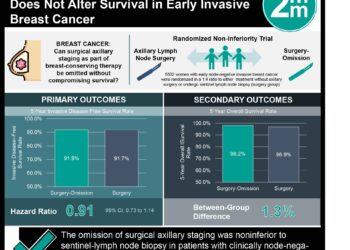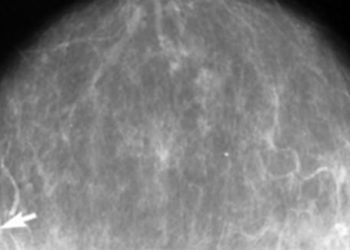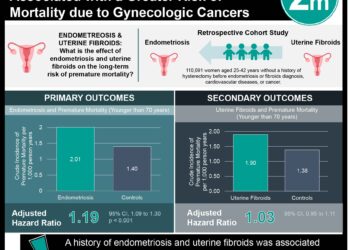Breast implants linked with later stage breast cancer, mortality
Image: PD
1. Women diagnosed with breast cancer, who have previously had elective breast augmentation surgery, have more late stage tumors at diagnosis.
2. Specific mortality associated with breast cancer is higher in women who have had breast implants.
Evidence Rating Level: 3 (Fair)
Study Rundown: Evidence suggests that breast augmentation surgery is not associated with a heightened risk of breast cancer, however this systematic meta-analysis investigated two questions: 1.) whether women with breast implants were more likely to be diagnosed with late-stage breast cancer and 2.) whether women with breast implants had a higher specific mortality associated with breast cancer.
Breast implants are known to be radio-opaque obscuring between 22-83% of the image and potentially hindering the detection of early stage cancer leading to a later stage diagnosis as the cancer develops. Researchers found that women diagnosed with breast cancer who had previously undergone breast augmentation surgery were more likely to have later stage tumors compared to women diagnosed who did not undergo breast augmentation surgery. Furthermore, researchers also found that women with breast augmentation surgery had a higher hazard ratio for specific mortality compared to the control population.
Conclusions from this meta-analysis are based on relatively few studies, twelve published papers for the first finding and five papers for the second. Furthermore, there are various biases and confounding variables such as genetic history that were not adjusted for in the study. More research in this area will be necessary to verify findings suggested in this meta-analysis.
Click to read the study in British Medical Journal
In-Depth [meta-analysis study]: This meta-analysis of peer reviewed published studies included women who had been diagnosed with breast cancer and also undergone antecedent breast augmentation. For most of the studies included, this group was compared to a control population of women who were diagnosed with breast cancer but had not undergone breast augmentation surgery previously. Interestingly, in one study used, the sample population was compared to women who had received other elective cosmetic surgeries (rhinoplasty, otoplasty, coronal brow lift etc.) but not cosmetic breast implant surgery – in order to control for socioeconomic and lifestyle factors. In this comparison the association between late stage detection and previous breast implant surgery was stronger than the normal control population.
The results from this meta-analysis were identified using an odds ratio with a random effects model to determine associations within the studies. For the first finding regarding stage of detection, the odds ratio was 1.26 (95% CI .99 to 1.60). The specific mortality finding had an odds ratio of 1.38 (95% CI 1.08 to 1.75). These findings are significant but based on relatively few studies; conclusions need to be supported by further research before changes in clinical protocol are warranted.
By Jordan Anderson and Andrew Bishara
More from this author: Contraband tobacco leads to reduced smoking cessation; Circulating tumor DNA used to monitor metastatic breast cancer; Salt intake linked with autoimmune disease; Continuity in diabetes provider improves outcomes and decreases costs
© 2013 2minutemedicine.com. All rights reserved. No works may be reproduced without written consent from 2minutemedicine.com. Disclaimer: We present factual information directly from peer reviewed medical journals. No post should be construed as medical advice and is not intended as such by the authors or by 2minutemedicine.com. PLEASE SEE A HEALTHCARE PROVIDER IN YOUR AREA IF YOU SEEK MEDICAL ADVICE OF ANY SORT. Content is produced in accordance with fair use copyrights solely and strictly for the purpose of teaching, news and criticism. No benefit, monetary or otherwise, is realized by any participants or the owner of this domain.





![Childhood ADHD associated with increased risk of suicide [Physician Comment]](https://www.2minutemedicine.com/wp-content/uploads/2013/03/PET-image1-e1377449984183-75x75.jpg)

